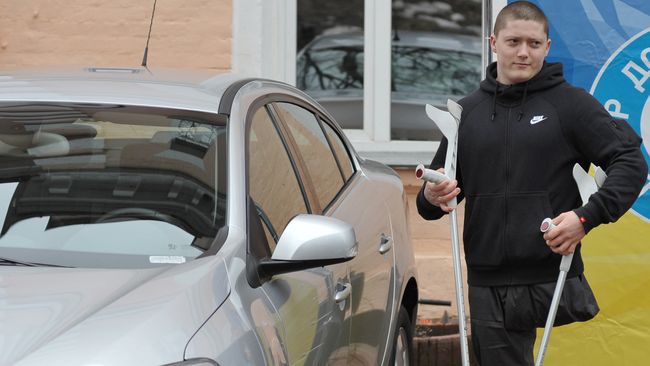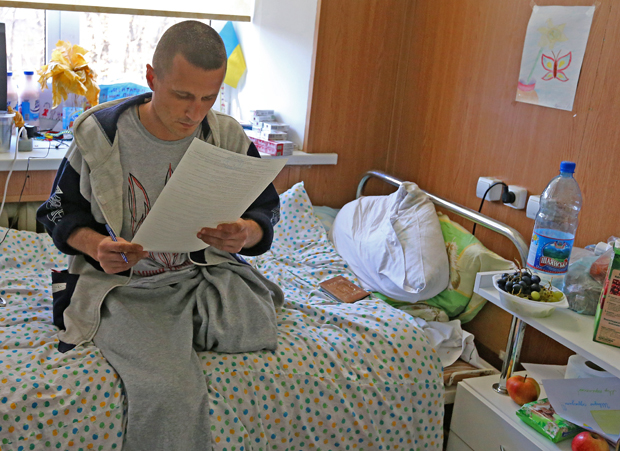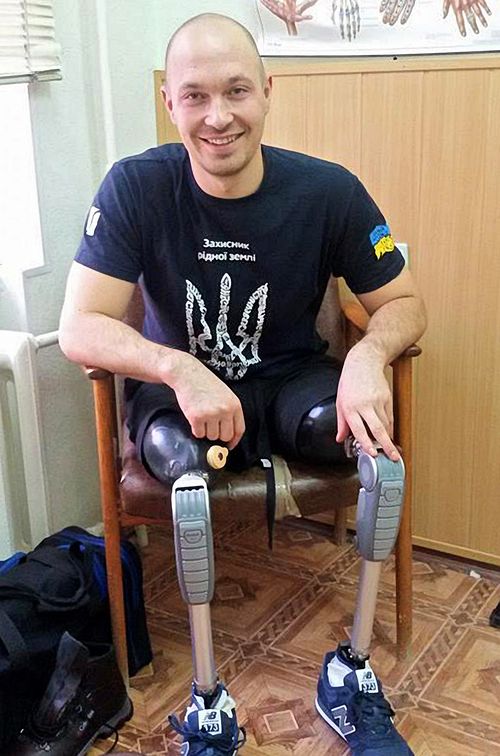“You just have to set a goal and fight for it every day”
The Day talked to soldiers who have or need prostheses and learned what domestic and foreign prosthetic industry can offer them
Yaroslav Myronov served in the 30th Novohrad-Volynsky Mechanized Brigade. At the beginning of military actions in the country, the soldier was on the rotation, came back from Kosovo, where he participated in a peacemaking mission. But he could not rest at home, and ended up at the frontline in May. On May 22, the column of soldiers was ambushed near Rubizhne. The man was hit with a bullet in his left leg. Local doctors could not provide qualified medical aid. Myronov was whisked away by helicopter to a hospital in Kharkiv, a surgery was performed, but it was unsuccessful as well. He was taken to Kyiv (by bus this time, because no air transportation was available). By the time the wounded man was brought to a Kyiv hospital, doctors had to face a choice: to save the soldier’s leg or his life. His leg was amputated on May 24. But Yaroslav did not give up. He set a goal to get a prosthesis by September 1 and enroll at the Ministry of Defense Institute. He decided to serve the people of Ukraine despite his injury.
“At that moment, there were a lot of invitations to get a prosthesis, I rejected the foreign ones, because other guys needed to treat much more serious injuries than mine. I succeeded at obtaining a prosthesis before the fall began. I addressed the president back then to receive a permit to serve. And on September 1 I was back in the army. I am the only one that stayed to serve with an opportunity of further work at the headquarters or as a teacher at various institutions,” the soldier says.
During this time, he had to replace the prosthesis three times already, because the muscle on the wounded leg is growing smaller. Now Myronov is getting ready for the fourth replacement. He undergoes the procedure at the Ukrainian Center for Afghanistan Veterans Rehabilitation. If the first prosthesis was sponsored by volunteers, this time the state pays for it: there is a free prosthesis program for the ATO participants. Myronov is satisfied with the service, he says that our specialists make prostheses of good quality. And all in all, it is more convenient to correct an artificial limb in Ukraine. By the way, he does not agree to tell his story to all periodicals, only to those he trusts. He said with pride that Den is on the list of such periodicals, he has been reading Den for a long time.
THE NEEDS GROW, THE BUDGET DOESN’T
Myronov was lucky, because he served in the military before and did not have to beg any officials to assert his right for a state-funded prosthesis. The situation with volunteers is more complex. First battles, first injuries, first crippled soldiers only enhanced the problems that existed in the prosthetic industry, they forced the state to react or at least to pretend to react to the new challenge.
The Ministry of Social Policy has been talking about the reforming of the prosthesis and orthopedic branch since the fall. As Den wrote multiple times, this government body is changing the legislature for manufacturing enterprises, but these changes apply rather to documents than to the quality of the product. Experts complain about the unnecessary, in their opinion, certification for parts and components which are purchased abroad and already have quality certificates. And they still have to be checked in Ukrainian expert centers. Recently, an NGO “Pidmoga.info” published information that because of this second inspection, 8 to 60 million hryvnias are lost every year.
This year, 820 million hryvnias are allocated from the budget for prostheses. However, the money is divided between manufacturers not immediately. Valerii Poplavets, head of the Ukrainian Center for Afghanistan Veterans Rehabilitation, says that first the products must be made, and then the money will be granted. Moreover, this year the foreign currency exchange rate increased drastically, and no one will review the funds allocated for prostheses. That is, the demand for prostheses will grow, while the sum will remain the same. According to his forecast, they will have to make prostheses out of anything they have, and the quality will be worse.
A CERTIFICATE FROM THE PARALYMPIC COMMITTEE IS REQUIRED FOR A MOBILE PROSTHESIS
Nevertheless, the military do not complain about the quality of prostheses. They are convinced that domestic enterprises are capable of providing injured soldiers with artificial limbs of similar quality as the foreign ones. One of the oldest prosthetic enterprises in Lviv has been operating according to a German technology for a long time and is assembling artificial limbs from German parts by Otto Bock Company. Its branch in Kovel is famous as an enterprise that makes prostheses by European standards.
There are several prosthetics enterprises in Kyiv, and the oldest one in Ukraine is the Kyiv State Experimental Prosthetic Orthopedic Enterprise. It has branches in Chernihiv and Cherkasy. Soldiers have a right to choose the services of which enterprise they wish to use. Experts advise to visit several enterprises if possible, see the products, and then choose the most optimal solution. The situation is more complicated with prostheses of upper limbs. Men need bioelectric prostheses. They are made by only a few enterprises in Kyiv.
However, state structures still have something to work on. The experts have been preparing recommendations for a real reform of the prosthetic branch for several years. Poplavets outlines the main drawbacks: extended terms of use of prostheses, now the warranty for complex prostheses is four and a half year, and this means constant repairs and additional problems for a disabled person. There is no clear procedure of provision of people with prostheses, and also, the dialog between citizens and officials is absent.
And experts say that the latest “gem” from the Ministry of Social Policy is the order No. 37 “On Establishment of Definition of Functional Capabilities of a Disabled Person.” It applies to people with leg prostheses. If translated from officialese, it means that depending on the speed with which a person can move around at home, outside, or at work, the officials divide such mobility into five stages. Each stage has its own prosthesis and terms of receiving it. So, in order to receive a prosthesis of the fourth stage of mobility (unlimited movement in a building and outdoors), a person must present a certificate from the Paralympic Committee (!).
Along with that, deputy minister for social policy Vasyl Shevchenko keeps on telling the public that reforms in the prosthetic and orthopedic branches will continue.
IN SPRING, AMERICAN SPECIALISTS WILL SHARE EXPERIENCE WITH DOMESTIC MANUFACTURERS
Another option is to receive a prosthesis abroad. A part of soldiers, if they have an opportunity, choose this option. Usually foreign specialists come up with the initiative to treat our soldiers. Volunteers, public experts, and manufacturers state this unanimously. There is a special committee under the Ministry of Social Policy, which chooses soldiers whom only foreign experts can help. But they try to use the Ukrainian option whenever it is sufficient.
Since they know about our disaster, foreign doctors and prosthetic experts offer their help first. Thus, Latvian clinic “Valter’s Eye Prosthetic Laboratory” agreed to carry out 60 prosthetics operations for Maidan and ATO participants. Den wrote about the large-scale program by the Italian Foundation of Rehabilitation Centers Padre Pio, which is ready to manufacture modern electronic prostheses for our wounded soldiers. Thanks to computer programs, Italians created a prosthesis, which has maximum resemblance to a real leg. The first lucky patient has already been treated by the Italian experts. And what is important, prostheses maintenance will take place in Ukraine, a special department will be opened for that.
We have the deepest respect for Canadian Ukrainians, who do not forget their Fatherland. Antonina Kumka is a Ukrainian-born teacher in Canada. She has launched the Ukraine Prosthetics Assistance Project, aimed rather at those who are working in the prosthetics industry, it is a sort of extension courses for specialists. Kumka was able to contact the US-based non-profit organization ProsthetiKa. Its president Jon Batzdorff is now gathering a team of specialists who volunteer to come to Ukraine and share their know-how from April 25 through May 8.
“We have rather high positive expectation, for we will not only provide quality, state-of-the-art prostheses to five patients during this two-week mission, but also lay foundations for independent development of complex prosthetics and rehabilitation in Ukraine. Specialists from various regions of Ukraine will be taking part in the project, which also means that upon return home they will be able to help on the spot,” writes Kumka on her Facebook page.
“NO PROSTHESIS WILL EVER REPLACE A LEG”
Kumka admits that it is impossible to take all patients abroad for treatment and prosthetics. Yet it is quite possible to improve the quality of assistance at home, in Ukraine. Volunteers and manufacturers note that our prosthetics specialists have recently made considerable progress.
“Speaking for all our manufacturers, I can say that they are using promising technologies, it is not absolutely necessary to travel abroad. Let volunteers find the money, and then, the prostheses need to be serviced and replaced. Secondly, the money from prosthetic industry in Ukraine goes to the Ukrainian budget, while abroad it stays abroad,” explains Poplavets.

IN KYIV HOSPITAL
“I’m looking at the boys who were taken to Austria and given the very same prostheses like the one I have, but for insane money. Moreover, if those boys do not want to walk (and believe me, the pain is so bad that it kills the desire to walk), you can even take them all the way to America, but it will help little. I’m carrying my prosthesis 12 hours a day, it is very difficult, but you have to overcome the hardships,” Myronov joins in. “No matter what they say, no prosthesis will ever replace your leg. Don’t buy it. I used to do sports, now I’m done with it. Only sometime in May can I start swimming. You just have to set a goal and fight for it every day.”
REHABILITATION IS SO FAR NOT IN OFFICIALS’ FOCUS
If the situation with prosthetics is more or less tolerable, teaching how to use them, and rehabilitation in particular, have to go a long way yet. We heard the story of a soldier Viktor Boiko from his brother Roman. Viktor is reluctant to communicate and will not recollect how he became disabled, he is not ready for this. And this is what social services should pay attention to. It is a good thing to provide a soldier with a prosthesis. But what is he supposed to do with his life?
Roman told us that Viktor served on the contract basis in Berdychiv. On a mission in Popasna he and his fellow soldiers ran into an ambush. He got several missile wounds, the left arm was amputated immediately there, and the right one is not functioning yet, although it has been 10 months since the accident. The funds for the prosthesis were raised by volunteers.
“We decided not to wait, otherwise muscles might atrophy. And we also wanted to give my brother at least some independence. Now he can hold a glass of water in his hand. We have also ordered a working extension for the prosthesis, to take up a screwdriver, for example, and do something about the house. When Viktor saw that extension, he wanted it immediately. He can also work with the computer,” shares Roman.
WORK INSTEAD OF SELF-PITY
Fortunately, there are positive stories to tell. Yulia Danylchenko, a volunteer helping the wounded at one hospital in Kyiv, recalled a soldier named Oleksandr Chalapchii. He was mobilized to the 34th Territorial Defense Battalion in Kirovohrad, and on August 28 lost both legs during the so-called armistice, in a bombardment outside Horlivka. His photo in a wheelchair, with two leg prostheses and a broad, sincere smile shining on his face, makes tears well up in your eyes. Danylchenko says that she has never met such a cheerful, enthusiastic man. Even in his condition he enjoys life, he was able to return to his work (his wife and five-year-old daughter need his care), and even helps the families of two deceased soldiers.

OLEKSANDR CHALAPCHII LOST BOTH LEGS AT HORLIVKA ON AUGUST 28, WHILE SERVING WITH THE 34TH KIROVOHRAD TERRITORIAL DEFENSE BATTALION. HOWEVER, HE HAS RETAINED HIS OPTIMISM AND LOVE OF LIFE. FOLLOWING PROSTHETIC TREATMENT AND A REHABILITATION COURSE, HE HAS RETURNED TO WORK AND HAS BEEN HELPING TWO FALLEN SOLDIERS’ FAMILIES. HE HAD ANOTHER CHILD BORN TO HIM PAST WEEK / Photo from the website facebook.com
But this is rather an exception from the rule. Most of the amputees still need psychological assistance. “The men who come back from there, they all have looked death in the eye. Now rehabilitation centers are only about to be launched, but there are already some hurdles and obstacles. There are many professional psychologists working with soldiers, but they must have an office of some sort, where they can consult,” says Danylchenko, hinting that there is no end of work to do.
“The most horrible is when you start feeling pity for yourself after amputation. That will take you nowhere. I got calls by authorities and was asked how they could help me. The first thing is that these boys must get busy with something. Not just going to a movie or a soccer game once in a while. They must get real jobs, or they have to go and study, otherwise they begin to drink, that’s what we learned after Afghanistan. In the ATO we will get the same experience. But when I suggested to those ladies from the authorities that they open a driving school, so that amputees could learn how to drive now, all contacts and calls stopped,” relates Myronov. “But this condition remains for life. It is very hard to move around in the winter, especially in the snow. New electronic prostheses, made in the West, have bending knees. With ours, you cannot lift your leg, you can only flip it. Attention and care is absolutely necessary in any case.”
Now Myronov is learning to drive, and he pays for it with his own money. He walks to the university (fortunately, he lives nearby). His advice is to never give up and make the best of it. Our problems seem so insignificant next to his courage and desire to live, despite all the hardships. We should be proud of such men and set them as an example for ourselves.
Newspaper output №:
№21, (2015)Section
Society





